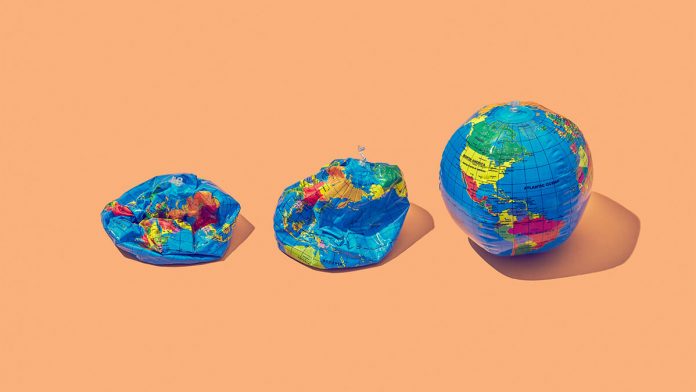This article is written by Ayushi Mahajan, currently pursuing BBA-LL.B from Centre For Legal Studies, Gitarattan International Business School (Guru Gobind Singh Indraprastha University). This article talks about the situation of businesses and CSR during the times of coronavirus.
Table of Contents
Introduction
None of us believed that an outbreak of disease would initiate a halt in our day-to-day activities. Even with a vast array of advanced medical facilities in the 21st century, it is all transparent how the health crisis turned into an economic crisis. Why and how did the spread of coronavirus bring global trade and economy to its knees? The initial outbreak of coronavirus in China disrupted global supply chains. The week ending on March 21, 2020 saw 3.28 million Americans register for unemployment benefits as coronavirus-induced layoffs grew in and around the US. Even when the short-term affects the end, the long-term trade and economic impact will ripple for years. Many businesses, especially the one that are in the field of hospitality and tourism, almost ceased to exist. The purpose of all organizational functions is to prioritize and optimize expenses or to postpone tasks that cannot bring value to the current environment. Along with this, businesses associated with online communication, online entertainment and online shopping are witnessing unprecedented growth.
Corporate social responsibility : meaning and concept
Corporate Social Responsibility (CSR) is a self-regulation business model that helps a company to be socially accountable – to its stakeholders and the public. By practising corporate social responsibility, also known as corporate citizenship, companies can become aware of the impact on all aspects of society, including economic, social and environmental.
Engaging in CSR means that, in the normal course of business, a company is working in ways that enhance society and the environment, rather than contribute negatively to them.
The contribution of companies in normal times
This is in light of the view that one can understand why companies are asked to play their roles within the community to which they belong. Among other things, improving one’s social responsibility does not mean taking action outside the company; Conversely, CSR can also take the form of internal policies affecting employees and the workplace.
For example, Google has long initiated a series of useful projects to establish itself as a socially conscious brand. One such project is Google Green, a CSR initiative that focuses on environmental sustainability.
Since it started on this route, the company has reduced energy costs in its data centres by up to 50%, thanks, among other things, to a comprehensive program that promotes recycling among its employees and Invests $ 1 billion for development. Implementation of renewable energy projects.
CSR and COVID-19
Covid-19 – Infectious disease infected by coronavirus has been considered a global epidemic by the World Health Organization (WHO). This contagious disease severely disrupted the socio-economic conditions of the whole world.
Covid-19 presented a challenge for firms and organizations regarding Corporate Social Responsibility (CSR). It has been reported that many firms/retailers have tried to make profits from the crisis. Essentially, the epidemic has put companies under trial for their commitment to ethical business conduct and CSR. Some have argued that the financial pressures caused by the epidemic may push firms to achieve short-term gains and sometimes through fraud and malpractice and reduce long-term CSR investment, possibly due to lack of resources and due to increasing pressure for survival.
A firm’s genuine and authentic CSR will create strong synergies between its customers and the general public as they have strong expectations from major brands regarding their efforts to combat the virus during the current crisis.
There is no doubt that CSR activities are aimed at the general public, but it starts with the employees of the organization. In this time of the epidemic, many companies have taken precautionary measures to get most employees to work from home. In addition to resizing the logo to express the importance of social disturbances, many companies have changed their advertising slogans to understand the importance of social disturbances.
For example- Nike’s new slogan is “If you have ever dreamed of playing for millions around the world, now is your chance, Play Inside, Play for the World.” The new slogan for Pizza Hut signifies “Pizza Home”.
Consumer ethics
The Covid-19 pandemic, as an unprecedented situational and contextual factor, has important implications for the understanding of consumer ethical decision-making during the pandemic as well as a potential long-term pandemic. During the epidemic, many consumers accumulate in their homes with limited outdoor use, except for the Internet, due to lockdown and other social distortion measures. Consumer decision making during current epidemic crises can be irrational, as is found by stores of food, medicines, hygiene and hygiene products and even toilet papers all over the world. Some may argue that panic buying (including Stockpiling) is a perfectly rational consumer behaviour during crises, with high levels of uncertainty.
The epidemic has given consumers the opportunity and time to reflect on the original meaning of consumption and the impact of their consumption only on themselves and others and on the general society and the environment. Prior to the epidemic, consumers in the developed world could easily meet their basic needs such as food and shelter through the wide availability of various products and services.
In fact, consumers were “spoiled” with “option surcharges”. In addition, consumption is also driven by consumers’ pursuit of goods and services that can help meet their high social (eg, socially related and self-esteem) and self-realization needs. Pandemic is teaching consumers a lesson that we are interconnected in terms of the impact of our product/brand choices, so we must be conscious of those choices. Consumers will be more likely to make judgments about themselves or others to make a fundamental assessment of people’s self-concepts (consumer identity) based on their responsible consumption and prosecution product/brand choices.
CSR should be concrete and consistent
Consistency is another aspect that should not be underestimated when planning corporate social responsibility interventions. Whatever action one decides to take, it is important that it is closely linked to one’s company’s core business. If every company is expected to do its part, the best place to start is with the areas and activities you know best. Ultimately, in emergency situations, not only economic resources are required, but skills and technical knowledge must also be maintained. This is fine, yet, for at least two reasons, companies should share it with the rest of the community. For one, it is about effectiveness: Based on production, materials, skills, and knowledge of the field, a company will likely have the most impact, early and positive results in its own region or even neighbouring region. This is right in the time of crisis where unity and sense of belonging are important for any community. For this reason, it is necessary that a company also expresses this sense of belonging and shows that it is an active part of the community. Communication should also follow this line, where initiatives taken can be seen in support of the common people, where the action is not just about fulfilling a duty, but about supporting the larger community because this is the right thing to do.
The impact on the marketing philosophy
Marketing is an interesting study, discussing the numerous ways Covid-19 has changed the way our subjects and practices have changed. We recognize that the impact of Covid-19 has been deep and widespread so that we can review how the epidemic has changed core marketing concepts, marketing contexts, and marketing strategies.
Core marketing concepts
The widespread and deeply felt turmoil of the Covid-19 epidemic will affect marketing discipline in multilateral ways. As so many of our lives and societies have been uprooted, changed, and shaped by events, so are the philosophies, ideologies and fundamental principles that anchor our region. While it is difficult to predict this change too much, it seems that these developments will have a profound impact on the core marketing philosophy, mindset and concepts. More enlightened and progressive commentators and organizations have spied variations of the social marketing concept; In which the organization balances the short-term consumer with the long-term welfare of society. In the aftermath of COVID-19, it seems that the consumers, the societies and the organizations will critically reevaluate and question such philosophies and priorities. Economists, philosophers, and marketers have predominantly advocated long-term terminology, while real-world pressure has forced many policy-makers, companies and executives to have more immediate and pressing concerns.
The Context of marketing
While core marketing concepts have changed and continue to change, such changes reflect the turbulence that COVID-19 originated in the marketing environment. Recession, down-turn, warfare, revolutions, earthquakes, and volcanoes are minor bouts compared to global lockdowns and widespread state intervention not previously seen for the millennium.
Organizations’ marketing micro environments have been affected by a tsunami of change that transcends any previous fluctuations and re-inventions. The ways in which companies operate have replaced social disturbances and forced lockdowns requiring radical changes in operations and set-up. The supply chain globally had diverged substantially during lockdowns and local supply-chains extending to breaking-points in most industries and regions. Culturally, people’s views of nature and of the universe, of themselves, of others, have been shifted. While some predicted the timing of such events, futuristic and long-term scenario planners have long worked to highlight the ability of such dramatic and tragic episodes to affect the world. The exact nature of such changes in our society and our culture is unclear, but marketers should be at the forefront of discovering, explaining and responding to such changes.
Marketing strategy
Changes in the marketing environment and marketing landscape forced organizations to develop strategic agility before, and after, the epidemic. While strategists have long advocated agility in strategy-making, the lightning pace of COVID-19’s proliferation constitutes flexibility to the point of hypermobility necessary to develop such entrepreneurial agility.
Scholars of marketing strategy will seek to explore such new-found agility and incorporate such flexibility into their strategic processes. While implementing change has always proved troublesome, the imminent crisis appears to free up previously unfulfilled and very valuable resources. Exploring, describing and promoting such an approach should prove illuminating.
Whatever the most appropriate strategic orientation, the post-Covid-19 marketplace is irrevocably different. A key aspect of this is the rapid growth of online communication and change. A very fast-growing medium was (at least briefly during lockdown conditions) fully effective (or, at least, prevalent). All industries and sectors found the change immediate and profound.
Conclusion and future research directions
This epidemic offers great opportunities for firms to actively engage with various CSR initiatives during crises, and possibly catalyze a new era of CSR development in the long run. For consumers, the ethical dimensions of consumer judgment have attenuated during the epidemic, causing consumers to be more responsible and likely to shift towards prosecution consumption. Such changes are likely to be reflected by firms and organizations. The fundamental changes in our lives will affect our beliefs, attitudes and opinions so that astounding marketers will adapt to reflect their policies and strategies.
Will the social marketing concept and more responsible business inclinations have a long-term resurgence? Although the immediate impact of the COVID-19 epidemic seems obvious, what could be the long-term impact on CSR and consumer ethical decision making? What are the opportunities and challenges for CSR in coronavirus after a long time? Will a short-term change in consumer habits lead to a long-term continuous change of consumer ethical behaviour, if yes, how? How will COVID-19 change our marketing philosophy? Will one consequence of this epidemic be the increasing inclusion of social issues in our driving philosophy? In terms of customer behaviour, there is an urgent need to detect how citizens, customers, and consumers have responded (both positively and negatively) to differentiate lockdown restrictions. Changes in behaviour may be readily apparent (such as tourist choices and steps to online shopping and entertainment) but changes in behaviour, values, beliefs are likely to be subtle. Similarly, while Covid-19 advances sector, firm, and organizational innovation, research needs to explore and expand the drivers of effectiveness that will prove beneficial over the long term.
References
- https://government.economictimes.indiatimes.com/news/economy/corporate-social-responsibility-in-times-of-covid-19-pandemic/75771467
- https://www.sciencedirect.com/science/article/pii/S0148296320303295
- https://www.doxee.com/blog/customer-experience/importance-of-corporate-social-responsibility-covid-19/
LawSikho has created a telegram group for exchanging legal knowledge, referrals and various opportunities. You can click on this link and join:
 Serato DJ Crack 2025Serato DJ PRO Crack
Serato DJ Crack 2025Serato DJ PRO Crack











 Allow notifications
Allow notifications


